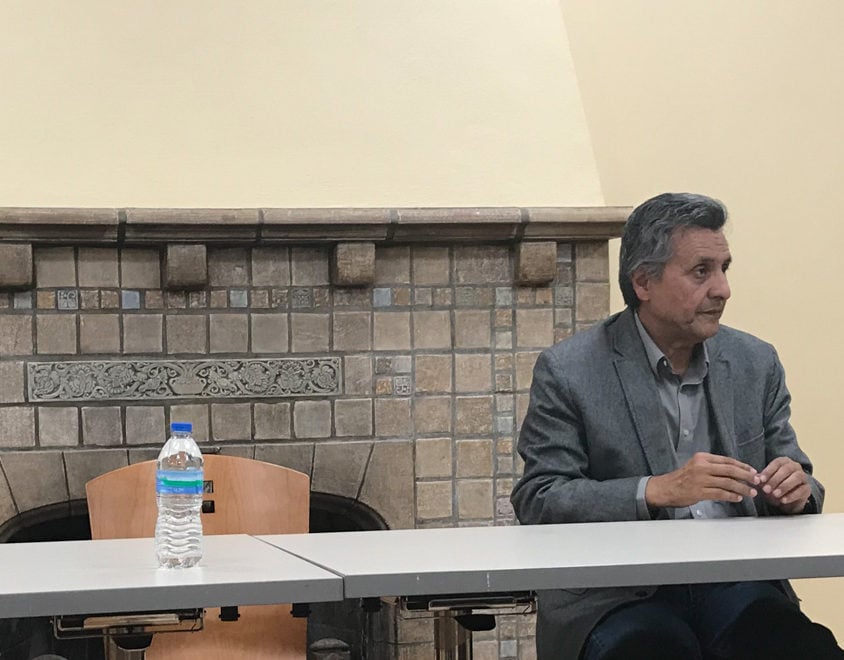On Thursday night, East Palo Alto Mayor Ruben Abrica discussed transportation in the Bay Area, and the impact of tech companies on the housing crisis, in a conversation hosted by Stanford in Government (SIG), Stanford Women in Politics and Stanford Coalition for Planning an Equitable 2035.
Palo Alto Mayor Liz Kniss was planned to join the conversation but did not attend for unknown reasons.
SIG co-director for general events Emily Katz ’19 opened the conversation by asking Abrica about his public service career and how his background shaped his political approach.
Abrica referenced his experience with educational research and volunteering at the Costano School in East Palo Alto, as well as his involvement in the East Palo Alto Citizens Committee and Corporation and the 1980s movement to form the first East Palo Alto City Council, of which he was a member.
“At the time, the Latino community was about 15 percent of the population,” Abrica said. “I was really the most visible and active member of this committee, and I felt it was on me to be a sort of representative.”
Abrica later discussed a tax measure on this year’s ballot as a response to Katz’s question about the expansion of tech companies in the Bay Area community and their effect on the housing crisis discussion.
The tax measure, if approved by at least two thirds of voters, will charge $2.50 per square foot on commercial retail space, generating $1.6 million off of today’s real estate.
“The state has not caught up with the high tech economy,” Abrica said. “The government is making nothing … The role of government is to anticipate so [tech growth] doesn’t become a crisis.”
If the measure is approved, 35 percent of tax revenue will go to build low-income housing, while remaining profits will be used for “job training opportunities for the high tech world,” according to Abrica.
“Palo Alto and East Palo Alto, we’re like the two sides of the American coin,” Abrica said. “As a community, [East Palo Alto] is not highly educated. We don’t have enough people who have all these skills needed for high tech jobs. We also don’t have an economic base that’s as strong as Palo Alto. So for us, it’s important to do this work force endowment.”
While Abrica described the housing system as “broken,” he expressed greater optimism towards the city’s transportation legislation, specifically regarding a new public and private partnership with the Old Dumbarton Bridge.
“Facebook commissioned a study to the San Mateo Transportation Board that looks at how we can activate the Old Dumbarton bridge to create a light rail from the East Bay to go through here,” Abrica said. “Facebook said they’ll put in a certain amount of money, but we have to raise the rest … We have to increase the toll so we can make that a reality.”
Abrica also noted Stanford’s expansion into the surrounding community, and he prompted audience members to act as stakeholders in the expansion process. Katz mentioned the “Stanford bubble” and the importance of Abrica’s presentation in increasing student awareness of local issues in which the University is involved.
“It’s like every 20 years that the University does a huge expansion,” Abrica said. “I would encourage all of you who are interested to follow up, whether it’s housing or transportation, and provide input or learn about the whole process.”
“I want to hear from you guys,” he added. “The fact that so many people raise so many concerns in some way forces Stanford to accept an extension of the spirit and open it up for more potential options including more housing. The county is interested in the long term plans of the University.”
Students for a Sustainable Stanford Director of Strategy Spencer Robinson ’20 said he attended the event to expand his focus from on-campus issues to larger Bay Area problems.
“Here, there’s almost a singular focus on career advancement and looking to work in the tech industry, but there’s not a consideration of the impacts of pursuing that career,” Robinson said. “Local issues may take a long time to be resolved, but they’re still important.”
Contact Udani Satarasinghe at usatara ‘at’ stanford.edu.
